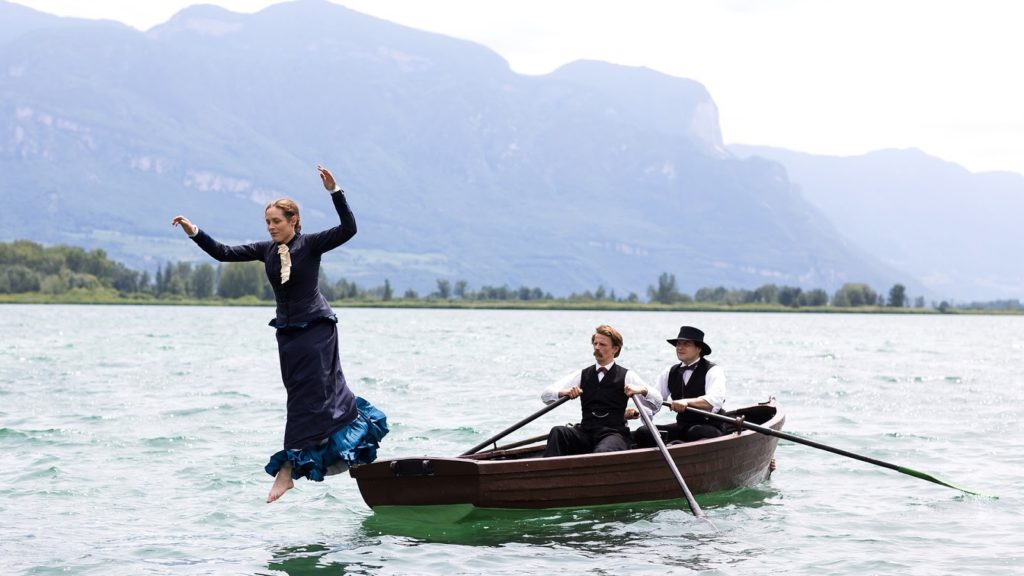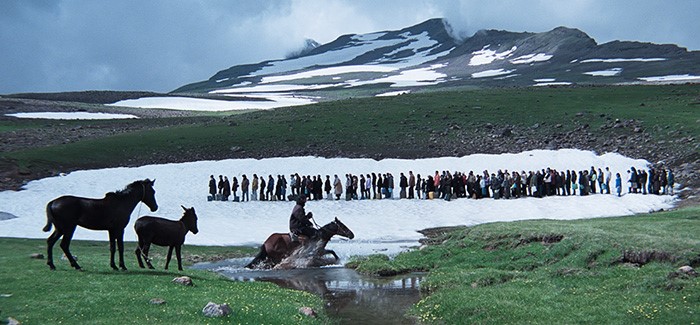NEW YORK (A.W.)—The Fifth Annual Socially Relevant Film Festival ended with the announcement that two films had won the Grand Jury Prize: “Lou-Andreas Salomé: The Audacity to be Free,” written and directed by Cordula Kablitz-Post and David Sarafian’s “Hot Country, Cold Winter.” Both are elegant and well-directed. The former recounts the life of the groundbreaking late 19th to early 20th century feminist Lou-Andreas Salomé, who influenced Freud and drove both the romantic Austrian poet Rainer Maria Rilke (Julius Feldmeier) and the philosopher Friedrich Nietzsche (Alexander Scheer) half-crazy with desire, in part by insisting that she wanted to be free of any physical entanglements, remaining chaste well into her twenties.

The latter is the second in a Sarafian trilogy and recounts in fairy tale-like manner the story of a middle aged couple—both artists—who live through the cold Armenian winters in the early 1990s that followed a crippling earthquake and a war with neighboring Azerbaijan. These harsh conditions reduced people to huddling underground for warmth and to chopping down the last trees in the street for firewood.
Ashot Adamyan is pitch perfect as Tigran, and his wife Katya is eloquently played by Yana Drouz, a woman whose kind heart and creativity ultimately save her from certain despair. Drouz received the festival’s best actress award. “Hot Country, Cold Winter” director David Sarafian should be commended for telling a difficult story, one where the cold itself becomes a palpable character, and which the director experienced first-hand in real life: “…My wife and I went through a near-total energy crisis. (Our) town was totally dark and the winter was freezing. In these circumstances, a relative visited us from England in the winter of 1992-1993 and said to me: ‘David, this is unbelievable. If this were to happen in England, people would eat or kill each other […] how can you stand it?’” Ashot Mkrtichyan’s luminescent cinematography adds to the picture’s allure: The first shot of a train slowly approaching at night—a light that ever so slowly grows out of the darkness—and a surreal scene of Armenians waiting on a makeshift food line on a mountain plateau stand out.
In spite of Drouz’ wonderful and touching performance, I would have liked to have seen the two main actresses from Kablitz-Post’s film Katarina Lorenz (main Lou) and Nicole Heesters (old Lou) share this award with her, especially given the latter’s subtle, layered portrayal of a woman who goes to her death never compromising on her admirable principles. Both these fine German actresses are sexy and smart, devilish and naïve—they give rare performances. “Lou-Andreas Salomé” also gets kudos for its artistic vision. The narration is enhanced throughout by well-timed shots of old fashioned postcard stills that come to life as movie scenes.

Lorenz delights as the daughter of an aristocratic St. Petersburg family who refuses to marry in spite of her mother and society’s insistent meddling. Lou is tough yet always conscious that the absolute nature of both her thought and actions consistently harm those she loves the most. As she recounts her life in her later years to the 40-year-old German publisher Ernst Pfeiffer (Matthias Lier), the entire history of turn of the century Middle European thought seems to play itself out for the viewer: Everything converges as the Nazis begin to burn books and Salomé must make some final, difficult life decisions. Directing a movie that is essentially about ideas and the willpower of one amazingly brilliant protagonist is no easy task, but Kablitz-Post pulls it off with brio.
The Socially Relevant Film Festival was founded by filmmaker and actor Nora Armani in 2013 in order to highlight movies that transmit positive social messages, depicting important social issues and human interest stories: “I started the SRFF because I was appalled at the violence we see on screen,” Armani states: “It seemed that every film poster or ad I saw had a gun, knife or violent depiction in it…I was also tired of violent forms of filmmaking with abrupt cuts, loud music, and special effects that say nothing.” Armani also had a more personal reason behind founding this increasingly popular fest: “Most importantly, I started it in order to commemorate my cousin and uncle who were victims of a violent hate crime in Egypt in 2004.”
Both films, which shared the spotlight this year, will hopefully enjoy extended theatrical runs in the coming months. As Armani concludes: “Each film in its own way pays homage to a certain time period and to people who today are heroes in our eyes.” And that’s as good a reason as any for filmmakers to practice their craft.
Submissions for the sixth annual edition of the festival open May 9. For details visit: www.ratedsrfilms.org.
***
“Lou-Andreas Salomé: The Audacity to be Free,” Exclusive One Week Engagement Starts April 27 @ Laemmle’s Royal
11523 Santa Monica Blvd. – West Los Angeles, Calif. 90025
DAILY: 1:20 p.m. | 4:10 p.m. | 7 p.m.* | 10 p.m. – For tickets: https://www.laemmle. com/films/43826
Saturday and Sunday have an additional 10:50 a.m. showtime at $8 morning show special pricing.
*Q&A with director Cordula Kablitz-Post following 7 p.m. shows on Fri. 4/27 & Sat. 4/28
General Ticket Prices: $13 Adult, $10 Senior (62+)
Watch the trailer here.


Be the first to comment